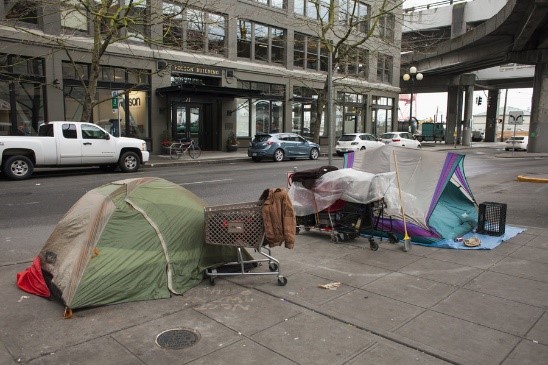Is criminalizing homelessness the solution?
‘This is my front door’, the woman in the front row was exasperated, holding up a photo of a small homeless encampment. She could not, she said, take waking up downtown day-after-day to rows of tents in front of the condominium she’s called home since 2000.
At a panel discussion on homelessness, hosted by DSA, the city, county and United Way shared their progress made in the last six months since the Poppe report. Results included: 322 people have moved into housing via United Way’s Streets to Home program, the city and county have extended hours at emergency shelters and five new Regional Access Points have opened to help people navigate the shelter system.
Despite the progress, a couple long-time residents – including the woman mentioned above – were there to voice their frustration: wasn’t it high time that the Seattle Police Department did something to enforce the ‘no camping’ laws?
Why does criminalizing homeless NOT work?
- It’s expensive. The costs of policing, court and jail costs are simply higher than the costs of housing. A growing body of research comparing the cost of homelessness- -including the cost of criminalization–with the cost of providing housing to homeless people shows that ending homelessness through housing is the most affordable option over the long run. In March, the Commonwealth of Massachusetts Housing & Shelter Alliance published a report placing the annual cost savings of housing a person at $13,531 per person.
- It can make getting off the streets even harder. Unpaid tickets or criminal convictions can severely restrict homeless persons’ employment options. Jobs that require a drivers’ license, for example, may not be available to a homeless person who has had her license suspended because of unpaid fines or a criminal conviction. It’s difficult to find a landlord to rent to you if you have a criminal conviction.
- It’s short-term thinking. Homelessness remains a national and local crisis. With rising rents and stagnated wages, many people experiencing homelessness have no choice but to live outside and in public places. Laws and enforcement practices punishing people for being homeless will not solve the problem. Until we address the root causes, more people will become homeless. In King County, one of these root causes is a lack of affordable housing. People with housing vouchers to cover 100% of market rent wait for months (sometimes years) for housing because it simply isn’t available. Many people who are homeless can pay some rent – but just $500 per month, according to this survey – and cannot find housing.
What is the solution to end homelessness? Getting people into homes. We – along with our many partners – are working hard to address the problem, but criminalizing homelessness is not the answer.





Comments